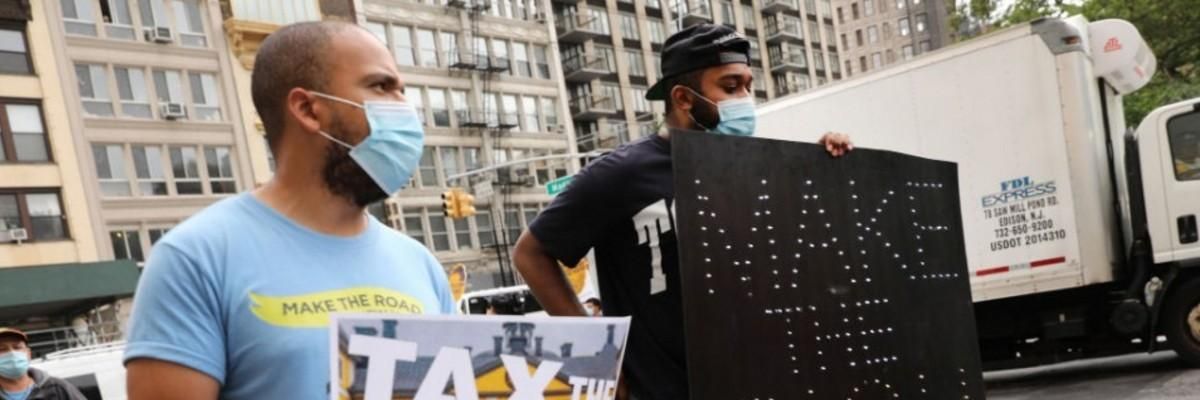The Build Back Better agenda under negotiation in Congress would improve the lives of millions of Americans by creating good jobs, expanding access to affordable child care and home care, and other vital public investments. Several tax reforms on the table to help pay for the plan would also reduce our country's skyrocketing wealth inequality.
Fairly taxing wealth is critically important because our country's wealth gaps are even bigger than our income gaps. ("Wealth" is the difference between what you own versus what you owe. "Income" refers to your revenue stream from wages and investments.)
And these wealth gaps are completely out of control, undermining our economic health and threatening our democracy. Today, the richest 1 percent owns more wealth than the entire U.S. middle class (defined as the middle 60 percent), according to Federal Reserve data. It hasn't always been this way. In 1990, the middle class held more than twice as much wealth as the top 1 percent.
Billionaires Income Tax
The most innovative wealth tax proposal on the table is a Billionaires Income Tax supported by Senate Finance Chair Ron Wyden and President Biden. While the details are still to come, this reform would require billionaires to pay annual taxes on their increased wealth, just like workers pay taxes on their paycheck income each year. This tax on just the 700 or so richest U.S. households could raise hundreds of billions of dollars for vital public investments.
To say that this elite group is well-positioned to contribute more to our nation's economic recovery is an understatement. In the 19 months since the beginning of the pandemic, U.S. billionaires have seen their wealth grow by $2.1 trillion to a total of $5 trillion, according to Institute for Policy Studies and Americans for Tax Fairness analysis of Forbes data. The five richest men have seen their fortunes expand even more rapidly than the U.S. billionaire class as a whole.
Closing the stepped-up basis loophole
President Biden has also called for the closure of a capital gains loophole that favors the wealthiest Americans. The "stepped-up basis" loophole allows the ultra-rich to avoid capital gains taxes on assets they pass on their heirs. Under current rules, people owe capital gains taxes when they sell an asset that has increased in value. But the ultra-rich can afford to hold onto their assets and simply borrow money at low rates if they ever need extra cash. Then when a family member inherits that property, the capital gains since their deceased ancestor first purchased it are reset to zero.
This "step up in basis" is a major factor in the entrenching of oligarchic dynasties. According to Institute for Policy Studies research, America's 50 wealthiest family dynasties together held $1.2 trillion in assets in 2020. The five wealthiest dynasties (the Walton, Koch, Mars, Lauder, and Cargill-MacMillan families) saw their wealth increase by a median 2,484 percent from 1983 to 2020.
Biden's original proposal would require inheritors to pay taxes on the full value of unrealized capital gains as soon as they receive the inherited assets (with strong exceptions for family farms and businesses). In the face of intense lobbying pressure, lawmakers are reportedly considering a revised approach: taxes would still be owed on the full capital gains (no stepped-up basis) but not until the heirs sell the asset.
Capital Gains and the Millionaires Surtax
A significant driver of our country's skyrocketing wealth inequality is the preferential tax treatment of income from wealth versus income from work. Under current rules, the top tax rate on capital gains is just 20 percent (plus a 3.8 percent net investment income tax), far lower than the top marginal income tax rate of 37 percent (40.8 percent).
Because the wealthy get most of their money from investments rather than ordinary income, this has allowed many rich Americans to pay lower tax rates on their total income than many middle class families. As IRS data show, the higher the U.S. income group, the larger the share of income derived from investment profits. By contrast, Americans who are not among the ultra-rich get the vast majority of their income from wages and salaries.
President Biden has called for top tax rates on wealth and work to be equalized at 39.6 percent. A House Ways and Means proposal raises the top capital gains rate to just 25 percent on gains over $400,000. But the Committee also calls for a special 3 percent surtax on the ordinary income and investment earnings of those making $5 million or more per year. That's a slightly larger group than the billionaires, but still represents just 0.04 percent of Americans.
As Institute for Policy Studies tax expert Chuck Collins points out, this "millionaire surtax" would apply to income from trusts, a common tax-avoidance vehicle of the ultra-wealthy. He also welcomes proposals on the table to beef up IRS enforcement capacity to ensure the super-wealthy pay their fair share.
The Millionaire Surtax would generate an estimated $127 billion over 10 years--enough to cover the cost of vital investments in the Build Back Better plan. For example, it could cover the cost of eliminating lead pipes ($30 billion), significantly expanding child food assistance programs ($35 billion), expanding high-speed rail ($10 billion), funding a massive forestry program, including a Civilian Conservation Corps that would employ about 20,000 people annually ($40 billion), and expanding clean energy through solar energy assistance in low-income communities and other means ($11.5 billion).
In the Build Back Better negotiations, lawmakers must stand up to pressure from lobbyists for the ultra-rich and embrace taxes that make a serious dent in the massive fortunes of those at the top of our economic ladder. Without tackling obscene wealth inequality, we cannot create an equitable economy that serves all Americans.

